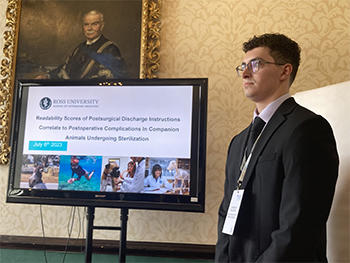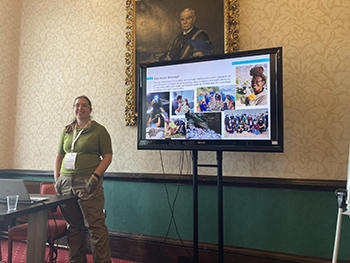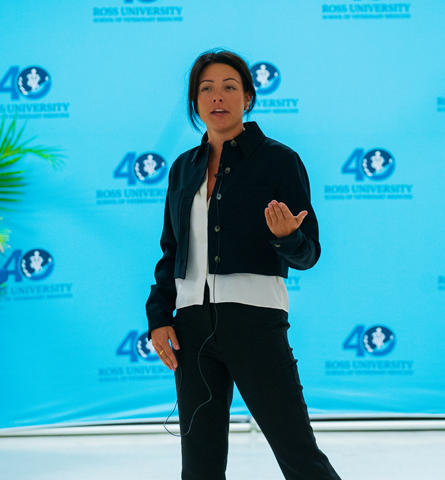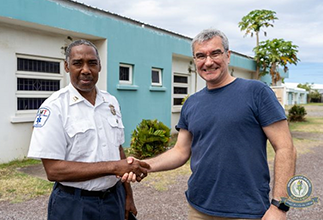Over July 6-7, several faculty members and one clinical student from Ross University School of Veterinary Medicine (Ross Vet) attended the Veterinary Schools Council’s annual Veterinary Education Symposium (VetEd) in Edinburgh, Scotland. The two-day gathering of leaders from veterinary schools around the world was an opportunity for Ross Vet’s academic leaders to take part in conversations, idea sharing, and innovations for teaching undergraduate and postgraduate veterinarians.
Five faculty members were in attendance as invited presenters across various topics on the theme of sustainable veterinary education – Rob Gilbert, BVSc, MMedVet, DACT, FNAP, FRCVS, associate dean for academic affairs, chief academic officer, and professor of theriogenology; Priti Karnik, DVM, MS, DACVS, assistant dean of academic operations, director of curriculum review, and clinical associate professor of small animal surgery; Ryan Cavanaugh, DVM, DACVS-SA, ACVS Founding Fellow, Surgical Oncology, associate professor of small animal surgery; Sarah Hooper, DVM, MS, PhD, assistant professor of physiology and director of Ross Vet’s research center for innovation in veterinary and medical education; and Kerry Rolph, BVM&S CertVC PhD FANZCVS (FELINE CHAPTER) DIPECVIM-CA FRCVS, professor of small animal medicine.
Christopher Biancaniello, Class of ’24, joined the faculty in Edinburgh as a student presenter for his research on postsurgical discharge instructions for companion animals written by third-year veterinary students. He found that student-written instructions measured too high in readability, meaning they were writing instructions in terms average readers might not fully comprehend.
According to Biancaniello, there were two primary findings in his research, saying that “even when veterinary students try to make discharge instructions simple, they are still too difficult to read and do not align with the patient reading material standards in human medicine. Secondly, the correlation between readability and postoperative complications shows us that our discharge instructions have clinical implications that could potentially impact veterinary education and practice by creating more awareness on this subject.”
For his work, he was awarded a Certificate of Excellence for the best student presentation.
“I was pleasantly surprised when I heard my name called during the awards portion of the conference,” said Biancaniello. “I meticulously prepared for my presentation as this was my first public speaking event that held significant value. I was then glad to see that my efforts availed.”
ROSS VET’S ACADEMIC DEVELOPMENT PROGRAM LEADS TO POSITIVE RESULTS, AND MORE FROM FACULTY-PRESENTED RESEARCH
The research presented by Ross Vet’s faculty covers diverse topics, including Ross Vet’s Academic Development Program to provide structured academic support for students in need, in-person versus remote lecture attendance and its academic impacts, veterinary medical education simulator studies, and clinical reasoning skill development.
In their presentation titled “Structured intervention of early term preclinical veterinary students experiencing academic peril improves academic performance,” Drs. Cavanaugh French, Jacobs, and Gilbert describe the Academic Development Program designed to improve academic performance of the lowest quartile of students advancing from first to second semester. Per their research, providing structured guidance in effective study strategies, wellness, and other academic successors is effective in improving academic performance of enrolled students. “The benefit of academic intervention [through the Academic Development Program] increases each subsequent term, indicating that students can continue to develop and apply the skills they learned as they advance through the program,” said Dr. Gilbert.
In other research presented, Drs. Karnik and Gilbert completed a study - “Does in person vs synchronous remote attendance impact academic performance?” - that found students performed better in small animal surgery courses when they attended in-person lectures rather than depending on the synchronous remote delivery of the same lectures. Elsewhere, Dr. Hooper presented her research - “Transparency, reproducibility and replicability of peer-reviewed analyses of veterinary medical education simulator studies” - on simulator-based veterinary education and found minimal data that supports simulator studies maintaining transparency, reproducibility, and replicability, the cornerstones of scientific literature.
Learn more about how you can get started on your own journey at Ross Vet here.









